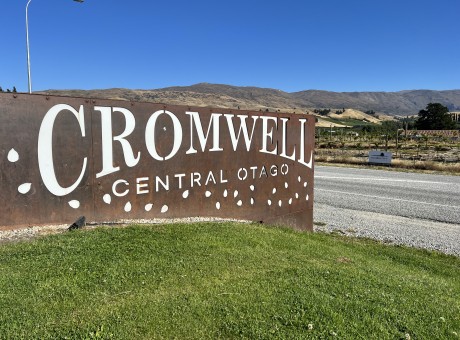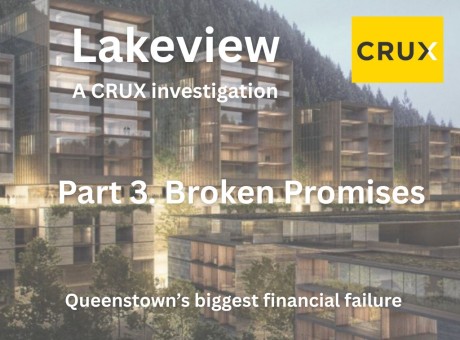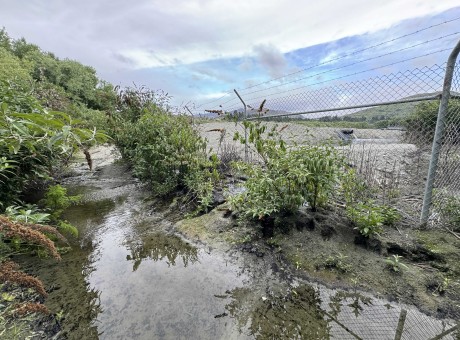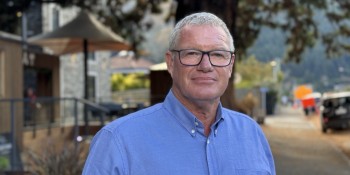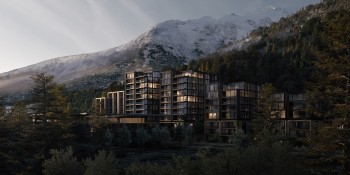Cadogan: Cromwell wins in district model - but locals remain unconvinced
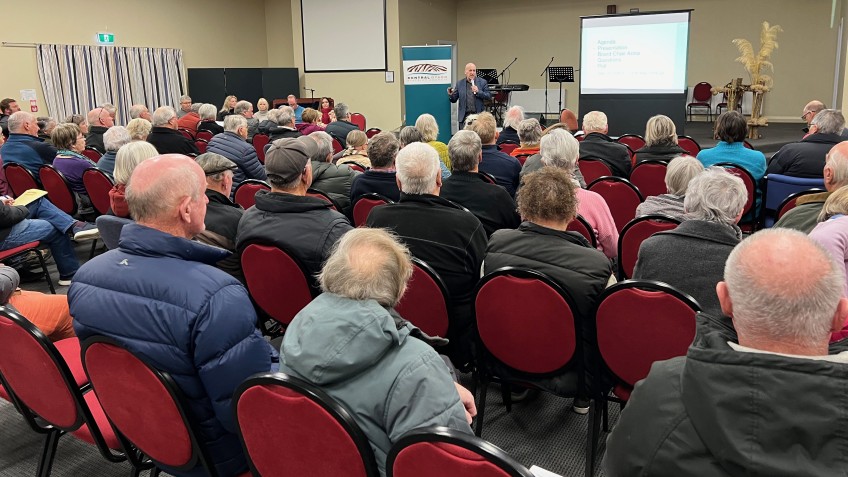
Rates bills for Cromwell will be lower if Central Otago opts for a district-pays rather than a wards-pay model - at least that's the view of Mayor Tim Cadogan at a town hall Cromwell meeting held last night.
But the more than 100 Cromwellians who braved the cold to join the discussion on 'districtisation' did not seem easily swayed by the sweetener, intent instead on trying to get some straight answers from the mayor on what they may stand to lose in the deal.
The main issue, endowment land - Cromwell potentially has as much as $300 million of it, and residents want assurance they are not seeing it slipping out of their control.
But as the scheduled hour-long meeting stretched to an hour and a half, the mayor was unwilling to provide them that assurance.
'Districtisation' is a made up word - as Cromwell Community Board chair Anna Harrison told those gathered, it won't be found in any dictionary - but it refers to a proposed plan to spread the costs of a council service or facility evenly across the district, rather than just across any one ward that may primarily be benefitting from it.
Roads and three waters are already paid for this way, and Mayor Cadogan says modelling done by council staff shows similar 'districtisation' of property, parks, cemeteries, pools and museums - one of the options the council is considering and wanting public feedback on - would save Cromwellians money - $52 per rateable property over 10 years, to be precise.
Last night the mayor told the audience at the Cromwell Presbyterian Church the district has "been here before", referring to a decision made close to 10 years ago to spread three waters costs across the district.
Then, Cromwell was the biggest loser, forced to stump up money to pay for infrastructure upgrades in other corners of the district.
At the time, "it was a really brutal gear change," he says.
Meanwhile, when it comes to roading, Cromwell ratepayers have effectively been subsidising other areas of the district for decades.
However, the mayor suggests this time round the tables will turn.
He has produced figures showing the ambitious $45.8 million Cromwell events centre, currently under construction, is expected to run at a loss, costing every Cromwell ratepayer $280 extra a year in rates.
"Average rates are about $4,000, so that's about a seven percent rise before anything else is added on to it."
'Districtisation', he tells those gathered, will spread that cost across all the district's ratepayers.
"It's going to be the Cromwell Memorial Hall, no question, but in effect it is the Central Otago Events Centre, and I'll tell you why, we're not going to build another one.
"And, as I've said to the people in the others parts of the district, 'Remember how much Cromwell is subsidising the roading? Remember how much Cromwell is subsidising the three waters?'
"There's an argument, and it's going to be one of the arguments in the councillors' heads on the 25th of September, that it might just be about time that the rest of the district helped out Cromwell."
After the meeting, the mayor declined to answer questions from Crux on the $280 figure and where it comes from, however council chief executive Peter Kelly was able to confirm no operating model for the new events centre has yet to be decided upon.
He says the running costs and their rates impacts are "high-level" estimates prepared by staff based on similar council-run facilities elsewhere in the country.
No decisions have been made on what commercial operators, if any, could lease spaces within the complex and, if they do, how much they will pay, nor have any decisions been made on what charges there will be for others using the spaces.
'It's worth a heck of a lot of money'
However, when it came time to take questions from the floor, no one voiced any concerns about the hall's suggested operational costs nor who would pay for them.
Instead, land, who would control it, how much it is worth, and what could be funded from any sale of it dominated discussion.
Without answers to those questions, Cromwell residents cannot be expected to meaningfully engage with the 'districtisation' debate, most reckon.
"It's worth a heck of a lot of money," the mayor says, referring to the potential land values locked up within the Cromwell ward.
How much? If developed as commercial blocks, $300 million is the upper figure being talked about.
There are chunks of endowment land in other parts of the district - the largest block includes working farmland in the Maniototo, plus a smaller amount in Alexandra, in the Vincent ward - as well as pockets of undeveloped freehold land, however their values pale in comparison to that of Cromwell's.
While both the mayor and the chief executive were clear last night proceeds from any sale of endowment land could only be spent within the boundaries of the old borough council, the chief executive says the council is seeking legal advice on where that boundary may sit today.
"Because the borough of Cromwell, back in 1890, was a small bit of dirt around the grid system," chief executive Peter Kelly says.
It was explained that while the sale of endowment land in Cromwell could not be used to fund the building of a new wastewater or drinking water treatment plant in Alexandra, it could be used to fund either in Cromwell.
And, as the mayor pointed out, that is a good result for the pensioner in Cromwell who would appreciate a few dollars knocked off their rates bill.
What he didn't say was it would also lessen the rates burden on pensioners in Omakau - and Alexandra, Roxburgh, Naseby and everywhere else in the district.
Despite many members of the public trying, the mayor refused to be pushed to make any promise on what the council would do given the option to capitalise off those land assets.
"All things would be up to future councils to consider," he says.
"What this ('districtisation') means is, when future bills come in, when future decisions have to be made in the LTP (Long Term Plan)...the future council can look at things in the whole, and say, 'Well, here's an option'.
"If we were going to have a significant land sale or development, there would have to be another consultation to say, 'Hey, we're looking at doing this, here's what the effect of it would be'. At the moment, you can't even have that conversation, because of the way we've always done things."
'One shot at it'
During her allocated time, Ms Harrison made a promise that her board will continue to advocate for a strong "partnership" when it comes to strategic planning in relation to this intergenerational land asset wealth wherever the 'districtisation' discussion lands.
"What we really, really want to make sure of is that we get proper input...so that if this district-funded model goes ahead the ability for the community board to still have real, tangible input into the things that are happening in Cromwell is written into those delegations (for community boards)."
Most in attendance showed their approval when Cromwell resident Sarah Thomas, one of the first to take the microphone during the question and answer time, stressed the need for the council to think about setting up future generations when it comes to any decision on spending Cromwell's 'inheritance'.
Another speaker argued Cromwell only has "one shot at it", and the council should resist the urge to squander asset wealth in the short term without strategic thinking.
Why the haste? More than one person from the floor suggested they felt uncomfortable with the speed of the 'districtisation' discussion and decision timelines.
The mayor's response - the looming Long Term Plan, under development and set to be signed off next year.
"We've got a heck of a mountain to climb - hundreds of millions of dollars in infrastructure over the next 10 years.
"The big problem we've got is council's got only a very few ways to fund the things that it does - rates and debt, they're the obvious ones."
He says while up in Auckland mayor Wayne Brown is selling off Auckland Airport shares and in Dunedin councillors are debating what to do with Aurora, in Central Otago "we don't have the ability to sell or develop any assets to try and help with our rates".
Freehold and endowment land fit the bill, but they remain under the control of community boards.
"I want to be really clear, if the council on September 25 decides to go ahead with 'districtisation' that doesn't mean that suddenly we would be putting up for sale signs....it's not going to be open slather."
But he says the power that lies with community boards in Central Otago makes the district an "outlier".
"Are we one district, Central Otago, or not?
"It's going to be one heck of a decision for the council."
Since the start of August, the council has been open for feedback on whether it should move towards 'districtisation'.
The Cromwell meeting is the fourth of five on the topic scheduled to take place across the district, with the final discussion set to take place online on Tuesday, August 27, between 7pm and 8pm.
The council has its own information page on the consultation, which will include a survey that will ask the community for their feedback on three options that are being considered.
Printed copies of the survey and consultation document are also available at council offices and libraries.
Read more: CODC restarts old conversation with new tagline - 'One District'
Main image: Central Otago District Mayor Tim Cadogan explains the council's rationale for further 'districtisation' at a public meeting held in Cromwell on Monday, August 19, 2024.





